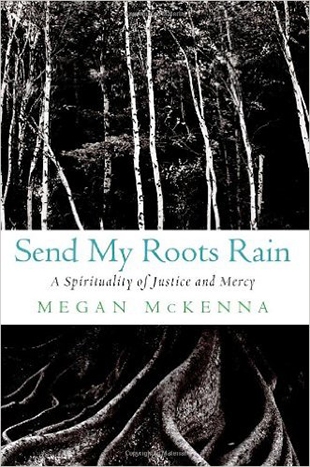Megan McKenna is an internationally known author, lecturer, retreat leader, and spiritual director. She received her doctorate from Graduate Theological Union in Berkeley, California, and has taught and worked in India, Singapore, Manila (East Asian Pastoral Institute), and at Maryknoll Mission Institutes in New York, Chicago, San Francisco, Dublin, and Albuquerque, where she currently lives. In 2001, she was made an Ambassador of Peace by Pax Christi USA. She is the author of more than 15 books including The New Stations of the Cross.
This top-drawer anthology brings together readings from McKenna's many volumes arranged under two thematic categories: justice and mercy. Of the first she writes:
"Justice, peace, and the poor are the strands of a single braid that ties all together in the world and ties us in turn to God. The definition of justice that I most often use is this: justice is love expressed in terms of sheer human need: food, water, clothing, shelter, medicine and health care, education, human rights and freedom, hope for a future for one's children, freedom from fear and violence, the dignity of work, and participation in society and history. Our lives are made of justice. Our moral and ethical choices are first of all about justice. Our relationships must be steeped in justice, or terror and violence begin to reign on earth and destruction inevitably follows."
And of mercy, McKenna says:
"Mercy is the rain of God, the reign of God, the rein of God. Mercy gives birth out of death. Mercy comforts and fills up with what is lacking. Mercy heals. Mercy not only forgets but remembers, re-members and puts back together better than originally. Mercy is best described by poetry, by music, by psalm, prayer, story, and silence. Mercy is the echo of the holy lingering, absent still among us. Mercy is God's hope and prayer for us."
One of the delights in reading this Catholic writer is the great appreciation she has for stories that connect with our imagination. Her purview of these gems extends to all spiritual traditions. Here is a wonderful example:
"Once upon a time Hazrati Ali's friend Muhammad was about to begin the prayers. He was anxiously looking about for his friend Ali, who hadn't come yet. It was very unlike his friend to be late, so devoted to the prayers as he was. Muhammad fidgeted about but then knew he must start.
"Just then, the Angel Gabriel appeared and held him back, asking him to wait just a bit longer-his friend would soon arrive. Ali, who had been hurrying to get to the mosque on time had fallen in behind an old Jewish man, moving very slowly, crippled and bent. Out of respect for the old man, Ali did not want to pass him up on the street. And Allah, the Most Compassionate One, did not want Ali to miss the first blessing and prostration of the day so he sent the Archangel Gabriel to delay the beginning of the prayers."
This is a wonderful example of the Muslim practice of adab or courtesy. McKenna sees it as a story about blessings. Ali blesses the old man by following him in respect and humility; the angel's appearance is a blessing; and the prayers are a blessing: "One blessing is rewarded by another, and another, and another. There are, it seems, no limits to blessings."
Many of McKenna's strengths as a spiritual writer are on display here: her continual exploration of the meaning of justice, the gospel witness to serve the poor and the oppressed, the need to return again and again to the parables of Jesus for renewal, the importance of Mary and all women in the early church, and the relevance of the words and the works of the prophets to our times. Another enchantment here is discovering for the first time some of McKenna's poems. Here is one that captures her soulfulness and spirit quite powerfully:
"A Trappist funeral reminds me...I want
bare feet, a white shroud or coarse cloth
a wedding dress of gray or white against the dirt
to match my hair long ago turned.
To be laid deep in the ground
for I have so loved earth.
A moment of clear blue turquoise sky above
to gaze on me and then the slap
of red New Mexico earth in my face.
I will be lowered awkwardly unevenly by friends.
Only one small change. Mix in flower seeds
at the very end so folk will have unexpected beauty
when I am gone away."
